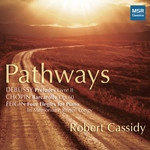|
Back
05/18/2016
“Pathways”
Frédéric Chopin: Barcarolle in F-Sharp major, opus 60
Joel Feigin: Four Elegies: In Memoriam Renée Longy
Claude Debussy: Préludes, Livre II
Robert Cassidy (Piano)
Recording: Hahn Hall, Music Academy of the West, Santa Barbara, California (February 2-4, 2015) – 65’ 46
MSR Classics #MS 1604 – Booklet in English

   
For his new CD, American pianist Robert Cassidy completes his cycle of Préludes by Debussy, having recorded Livre I a few years ago, and includes Chopin’s ravishingly epic Barcarolle and Four Elegies by Cassidy’s colleague Joel Feigin, dedicated to Feigin’s mentor, Renée Longy, a pianist and theoretician whose students included Leonard Bernstein.
Cassidy is a fine musician and pianist whose credentials include study at New York’s Manhattan School of Music with mentors including Constance Keene, a noted pianist and the wife of Abram Chasins, one of New York’s best known musicologists and reviewers, as well as a pianist and composer in his own right. (Chasins, along with Virgil Thomson, was a founding godfather of the eastern seaboard’s ongoing ‘egghead’ group of performers and composers who also wrote criticism, magazine articles and, more recently, internet blogs – Glenn Gould, Ned Rorem, Samuel Lipman and Jeremy Denk are just a few names which come to mind.) Cassidy studied further at Indiana University with Menahem Pressler, best known as founding pianist with The Beaux Arts Trio and also a superb soloist.
The three works on Cassidy’s new CD, titled Pathways, each depict some kind of actual or metaphorical journey. Feigin’s Four Elegies were composed in 1979, when Feigin was in his twenties, then revised in 1986. All four pieces are striking in a kind of mid-century ‘moderne miscellaneous’ way which may be heard as tonal or atonal. There are hints of Scriabin, though the final and slowest of the four borders on indulgent, and it reminded me of a piano teacher who once told students they were “picking flowers” when they failed to illuminate a slow-tempo work (composers also can be snared in this trap.) Overall, Four Elegies is typical of contemporary music in America during the 1950s and 60s when the composer (born in 1951) had been a child and teenager.
The journey in this work clearly is a highly personal one. Robert Cassidy’s performance brings loving detail, texture and warmth to this work and Feigin must be grateful that such a finely dedicated performance now is on permanent record.
The CD starts with Chopin’s Barcarolle, in a performance of exceptional detail and beauty. From the opening cadence over a rich C-sharp bass octave, Cassidy captures the work’s fluid, indeed liquid mood perfectly and shows solid command of the counterpoint between main melodies and inner voices which dominate the work. My one quibble is that the closing pages could have greater dynamic breadth and a bit more bite. As in the Polonaise-Fantaisie which Chopin completed at the same time (1845-46), these works end with a dynamically transformed recapitulation of earlier themes in a truly heroic manner.
Again, in the Debussy Préludes the pianist demonstrates a firm command of the wide ranging subtleties in these extraordinary works which, in terms of journeys, do reflect the composer’s visits to England and his evocation of other locales. Cassidy’s tempos are a bit slower than usual, but this further illuminates detail (he definitely is not “picking flowers”.) In some pieces one could imagine greater dynamic bite, such as in La Puerto del Vino, though the exquisite Bruyères seems a tad rushed.
However, overall Cassidy has a great deal to say about this wonderful music. Listeners won’t be moved to discard their Gieseking discs, but he brings genuine imagination and nuance to some of the greatest music written during the early 20th century.
Charles Pope Jr.
|